Posts Tagged ‘contract manufacturing companies’
The Power of Contract Manufacturing: How It Can Drive Down Costs and Increase Flexibility

The contract manufacturing industry is thriving globally due to its ability to drive the immense reduction in the cost of manufacturing goods and to grant companies increased flexibility faster than traditional methods.
In this article, we’ll take you through the primary reasons why contract manufacturing can deliver improved cost performance and production flexibility.
Reduce Labor Costs
Labor cost is a key element in the manufacturing industry. Typically, the labor is more expensive when you are from the developed world. So it makes more sense to outsource your production to China.
Depending on how far along you are in manufacturing your product, you may be paying upwards of 50-70% for labor costs.
When shifting to contract manufacturing, it’s typical to see those costs reduce by 30-50%. While lower costs aren’t guaranteed, there’s plenty of room for negotiation based on your volume requirements.
In some cases, companies have been able to negotiate down as much as 80% of their original labor costs. This is a massive saving that can help you create a more profitable business model from day one.
Reduced Capital Requirements
If you’re not ready to invest in building an in-house engineering team and buying expensive equipment, contract manufacturing is the best option to help you get a product to market with minimal risk.
You simply pay for services as needed rather than extra investment, otherwise, that will be a waste of having a facility with equipment that sits idle most of the time.
Some manufacturers may even let you use their machinery at fairly lower prices if you hold an order of larger quantities or have a good relationship with them.
Typically, a professional contract manufacturing company focuses more on improving efficiency. They have a pool of in-house specialized engineers because a company’s production efficiency obviously cannot be improved overnight.
Increase Inventory Flexibility
Since you are not tied to a specific factory, you can switch manufacturing plants at any time without having to change production plans. This gives you increased flexibility for where and when you buy raw materials as well as components needed for your product. In this case, you will never be stuck with too much or too little inventory if you have contract manufacturing.
Meanwhile, when you work with contract manufacturers, they handle all aspects of manufacturing including procurement and logistics.
The cost savings associated with using a third-party supplier is passed on to you in terms of lower prices. In addition, because these companies specialize in one aspect of manufacturing (such as PCB assembly), they do it better than anyone else in their field which means they can offer better quality products at competitive prices.
Increase Manufacturing Experience
If you choose a professional contract manufacturer who is specialized in what they do, you will be worry-free in many situations.
The most important one is that they usually have a customized plan for you to meet your needs in production, quality standards and lead time. It will be easier and more effective to get your project done.
The other excellent experience for you if you have a professional contract manufacturing firm is that they have one-stop supply chain services to deal with from sourcing, quality control, warehousing and shipping. With these services, you can save your time and money in finding other third-party companies for your business.
Manufacturing In China With Confidence
Contract manufacturing is only becoming more prevalent as time goes on. When your company needs contract manufacturing services, come to Shield Works. We take care of every aspect for you, so you can focus on innovation and launching products as quickly as possible.
With our well-established facility based in Zhuhai, Guangdong Province, we offer a range of services to accommodate your needs, from a one-time contract manufacturing and precision assembly to warehousing and fulfilment, without ever worrying about inventory or quality control. Our production process is streamlined, efficient, and optimized – so no matter what phase your business is in, we can take care of you.
We pride ourselves on excellent customer service and British background management experience. Contact us to find out how we can help with your project!
5 Qualities to Look for in a China Manufacturing Partner
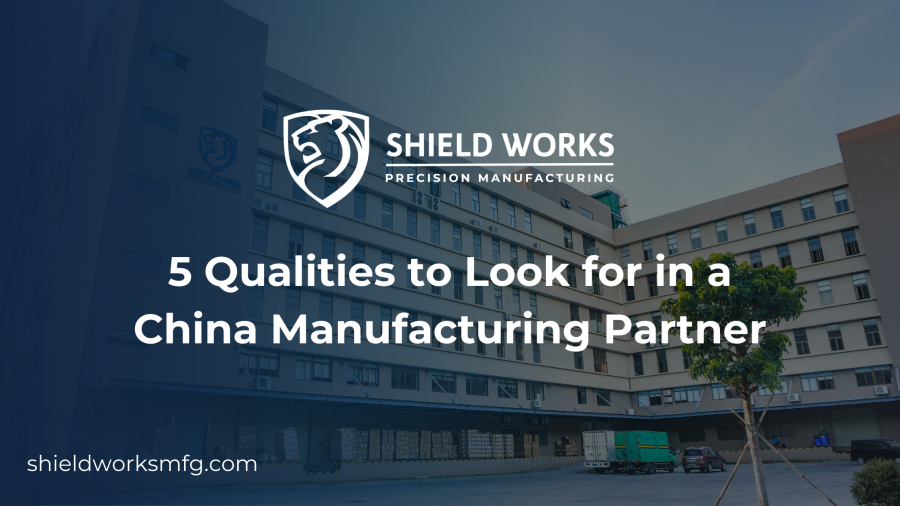
Finding the right manufacturing partner can be tricky, especially if you’re new to China manufacturing or just starting out with your business.
There are plenty of quality manufacturers out there, but it’s important to make sure that they have these 5 qualities before you enter into an agreement with them.
Only then will you know you can trust them and put your business in their hands without having to worry about things getting messed up along the way.
1) Knowledge
When you partner with a manufacturer, they’ll act as your vendor or factory.
This can be intimidating when you’re not sure what questions to ask or how much to spend.
A good China manufacturing partner will have knowledge of both manufacturing and international business and can help determine which factory or vendor is right for your product.
It’s important that your manufacturing partner understands what your product is, where it comes from and how it’s made—otherwise, how can he/she help you?
Skilled manufacturing partners are invaluable when it comes to navigating things like quality assurance, intellectual property protection and shipping logistics; manufacturers with specific knowledge will know exactly what questions you should be asking.
2) Transparency
If you have questions, or something goes wrong with your order, it’s nice to know that your manufacturer is open and honest about what happened.
It’s no good if you don’t get your calls returned or emails responded to quickly and thoroughly.
If you need a manufacturer who will constantly track and ensure they are producing quality products, make sure you ask around and do research before settling on one.
Chinese business culture can be complex and difficult for outsiders to navigate.
If you plan on doing business in Asia at some point, it’s a good idea to find someone who knows their way around and won’t hide how they do business from you.
3) Language
Communication is key with your new manufacturer.
Be sure you speak the same language.
If there’s a language barrier, it will make working together much more difficult and might lead to frustrations on both sides.
Make sure you clearly understand what your manufacturer will do—and won’t do—for you before signing any contracts or paying any fees.
You should be able to get an idea of their working style just by talking on Skype or even emailing back and forth for several weeks. (If they get upset easily when dealing with customers, it might not be worth continuing.)
If communication doesn’t go well at first, consider ending your relationship early rather than suffering through something that could eventually lead to problems down the road.
If you need much more timely response, you can also use WeChat, an IM chat app most Chinese use.
4) Dependability
Many manufacturers offer low-cost goods and services.
Although it might be tempting to use one of these companies, it’s important that you remember that you are paying for more than just products.
Quality customer service can be lacking from low-cost companies; you’ll want to work with an manufacturer who makes you feel comfortable and is always willing to answer questions.
This can help build a relationship of trust between your company and your manufacturer, which will be beneficial throughout your business venture.
On top of that, having direct access to someone at your manufacturer’s facility will make communication easier as you enter into negotiations
5) Personal Relationship
You might think that saving some money is good enough of a reason to choose a manufacturer solely based on price, but keep in mind that it’s much easier and more enjoyable to work with someone you already know.
You’ll get more out of your partnership if you feel like there’s trust and camaraderie on both sides.
Plus, buying in bulk will allow you to negotiate better prices than if you were working alone.
Your personal relationship should be one that allows communication channels open at all times.
This can also be a reflection of his/her relationship with suppliers.
In China, especially when it comes to dealing with factories, maintaining guanxi(relationship) is extra important.
It can make direct impact on how your order will be made.
Shield Works has over 16 years of manufacturing experience in China. Feel free to let us know if interested!
The Benefits of Using a Contract Manufacturer
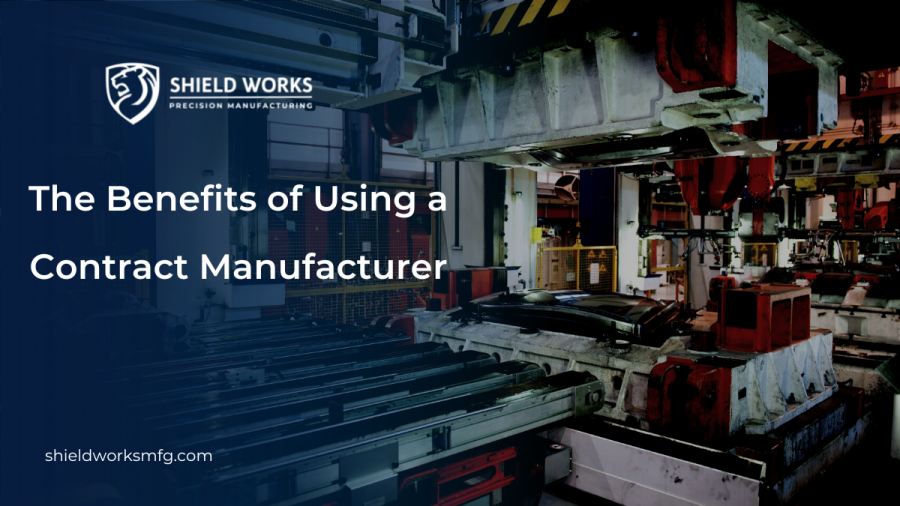
Manufacturing continues to grow throughout the years and has become incredibly profitable. Did you know that manufacturers contribute about $2.71 trillion each year?
If you’re thinking about using a contract manufacturer, you might wonder if it’s worth it. There are several benefits to using one, and some might surprise you! Read this guide on the various benefits of using a contract manufacturer today.
Keep Costs Low
Contract manufacturing is a great way to reduce the cost of your services and products. This is because there’s a lower chance of errors. You can also benefit from bulk purchasing and skilled labor.
All of this can lead to satisfied customers since you can lower the cost of goods. Manufacturing businesses specialize in high-volume production lines and cutting costs.
This means that you can focus on running your business instead of worrying about production or making errors. Many companies are experts in their field and what they sell, but they struggle with the production process. That’s where a contract manufacturer comes in.
Save Money
Did you know that manufacturing accounts for 12% of the U.S. economy? You’ll be able to save money since you won’t have to worry about buying equipment for production. Skilled laborers will already have the equipment that you need.
If a product is high in demand, a manufacturer can focus on decreasing the time that it’ll take.
Test Products
You can test products before they’re in the hands of your customers. This is a great way to save money by not producing a defective design.
Determine what the needs of your business are since each manufacturing company could offer different services. They can also make changes to the product as necessary.
They can improve the products, increase the production rate, and give you great profit margins.
Professionalism
Product manufacturing companies will provide you with products without errors. This will help the reputation of your company.
Some companies will try to do production on their own and then make a grave error. Let a manufacturer perform production and watch your production rates increase.
They can also bring fresh, new ideas to your products. Manufacturers are experts in design and can help your product shine.
Improved Efficiency
Many manufacturers learn how to reduce waste. They can perform various tasks such as painting, machining, difficult assembly, welding, etc. This can help reduce the manufacturing costs for your company.
Manufacturing companies can also provide you with more flexibility. Whether you’re looking to scale production, develop products at the same time, etc.
You can start and schedule projects when it makes the most sense for your business. You’ll also know that they’re using the top-of-the-line equipment in the company to provide you with high-quality products.
Save Resources
Since they’re knowledgeable about reducing waste, you can lessen your carbon footprint. This also means fewer costs for you.
Your staff will have more time to work on business tasks. You can focus on your business, marketing, etc.
If you wanted to do production yourself, you’d need to hire a large staff. This could include operators, engineers, managers, etc.
Whereas contract manufacturers already have their staff in place. You’ll have a large team working on your products without having to worry about shifts, payroll, or hiring workers.
Sell Your Products Sooner
Since managers can create your products fast, you can get your products out there to the consumers quicker. There are different methods such as CNC machining and Rapid prototyping that can help speed up the process.
You might be able to get your products out there in a few weeks!
Various Options
They can handle various aspects of the manufacturing process. These can include material purchases, product design for manufacturing, assembly, packaging, etc.
Since everything is happening under one roof, it reduces costs for you. They’ll handle the difficult parts of the manufacturing process so you as a business owner can have less stress.
Deadlines and Estimates
You’ll know in advance how much to budget for the process. They’ll provide you with a detailed estimate before they begin.
This will make it less likely that you’ll experience delays or unexpected costs. They’ll also be able to tell you how long it should take.
Improved Communication
If you try to have the product manufacturing process internally, you’ll need to contact multiple vendors at all times. Through contract manufacturing, you’ll be able to stay in communication with them. You won’t have to worry about a response.
Who Can Benefit From Manufacturing Contract Companies?
Most businesses can benefit from contract manufacturers. You might decide to use product assembly services in China since it’ll save your business money. Keep in mind that how skilled a manufacturer is will vary.
Some ways they can help include:
- Packaging products
- Manufacturing products manually
- Product assembly
- Creating computer models of products
- And more
When you’re first starting out with a production company, it’s a good idea to test out a contract manufacturer. See how their production process is and if it slows you down. You might find that you’ll have more time to focus on your business and productivity will increase overall.
Understanding the Benefits of a Contract Manufacturer
After exploring this guide, you should have a better idea of the benefits of a contract manufacturer. Take your time deciding if it’s right for your business.
Are you ready to speed up the process of manufacturing in your business?
Contact us today! We offer customized manufacturing, including developing new processes, using top-notch equipment, and customizing work procedures.
Can You Really Trust Product Development in China?
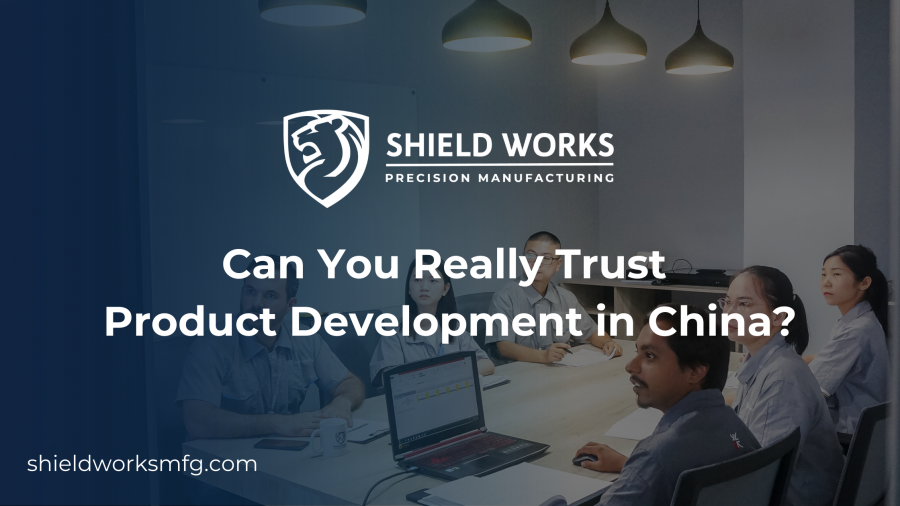
When you’re planning your next big product, where should you look to get it done? China or the United States? You might think that the answer to this question depends on your budget and how long you need the product to be in development, but that isn’t necessarily true. As it turns out, Chinese product development companies are capable of producing world-class products just as quickly as US companies and at a lower cost as well.
Is it a good idea to outsource product development in China?
Outsourcing product development to China may sound like an odd choice to many people. It’s not uncommon for engineers and product developers working on a project to assume that manufacturing abroad is only done when sourcing parts from other countries, but there are many advantages to having your new invention manufactured to China. For example, Chinese companies often provide their clients with ready-made factories, so you don’t have to worry about setting up a factory space before production begins. The best advantage of outsourcing product development, though, is cost savings; manufacturing costs are generally cheaper there than in Western countries, which makes it possible for startups to take risks they might not otherwise be able to afford.
After years of development, China is fully capable of developing quality products that can measure up to international standards. Many engineers and product developers think that outsourcing manufacturing to China is a risky decision because they believe that it would result in low-quality products. However, as more and more American brands begin using Chinese manufacturers for their projects, consumers are realizing just how reliable these companies can be.
Get it right from the start
The best way to avoid having quality problems later is to make sure that you are working with a partner who has great experience and impeccable standards from day one. Although there are myriad problems that can occur when making products abroad, you’ll want to make sure you have someone on your team that knows how to spot those issues before they snowball into disaster. Whether it’s something as simple as a minor translation error or as complex as a hardware issue, working with an experienced partner will help avoid major setbacks. Make sure you know what areas of your product and business could cause potential issues. No one can foresee everything. If you’re not certain about any aspect of your production process, do some research or consult with experts.
How long will it take to develop my idea and have samples made?
There are a number of steps involved in bringing an idea to life, from making some prototypes and testing them, to sourcing materials and having samples made. On average, it takes about six months from beginning to end. However, your product development timeline can be impacted by a number of factors (for example, if you choose to have your own custom mold created instead of using an existing mold). If you’re planning on manufacturing in China, there will also be shipping time factored into that equation. So how long does it take for samples to arrive? That depends on whether or not you’re going with standard shipping or DHL Express/UPS/FedEx delivery. With standard shipping, expect your sample shipment to take two weeks at most; with express delivery, expect one week at most.
But the pandemic is still here, and the world is more complicated than ever with everything going on. It is still subject to change.
How much should I pay for prototypes?
Even if you’re not ready to commit, getting prototypes made is often a good way to see what your product will look like (and feel like) and get a sense of its durability. It’s also worth considering that prototypes come with different price tags depending on their complexity. A simple injection-molded part may cost several hundred dollars and more, but full working samples can run into several thousand dollars. Get quotes from multiple suppliers and keep an eye out for low-cost prototyping options such as 3D printing; some firms even offer free printouts for first-time clients who bring them work.
How can I make sure you don’t rip me off?
It may seem scary to send money to someone you don’t know, but many clients work with their manufacturer to come up with an agreement before sending any payment. That contract should outline what will happen if there is a delay, how long it will take for delivery and what quality standards are expected. If you have concerns about your contract being followed, consider hiring a lawyer or working with someone who has experience making products in China. That way you can have peace of mind that nothing will go wrong and get exactly what you ordered.
There are definitely some reasons why you may or may not want to trust product development in China. But by investing time into finding a reputable partner and carefully researching them before handing over your project, you’ll be far less likely to have an issue. Shield Works has a history of 16 years in product development in China and certainly knows your language coming from the UK. Please contact us if you are interested in getting to know more!
4 Things You Must Know about IP Protection in China

There are many things that businesses need to know before they start operating in China, and IP protection is one of them. It’s particularly important to be aware of these things if you’re doing business in the Chinese market—or any emerging market, really. Here are four things you need to know about IP protection in China that could help save your business down the road.
1) Don’t forget you are a foreigner
Protecting your intellectual property rights (IPR) can be a tricky process in any country. It’s even more complex when dealing with a foreign jurisdiction like China, which has its own set of laws and customs that are different from what you may be used to. While no one likes to think they might ever need to use IP protection methods, these can be an important asset if you do start to experience problems. However, before seeking legal help or going after someone for infringing on your IPR, remember that many IP cases fail because companies make basic mistakes; it pays to know some of them before taking action. For example: Don’t forget you are a foreigner – While Chinese laws should protect you against infringement, don’t assume that they will.
Remember that there is always a chance that local law enforcement will not support you, so it’s important to have backup plans in place. Remember who owns what – In China, registered trademarks are owned by their registrant rather than being assigned based on where products are sold. This is opposite of most countries and means you could end up losing ownership over your trademark simply by not registering it properly. Use multiple forms of IP protection – Just as businesses in China often use multiple locations for manufacturing facilities and offices, they also tend to rely on multiple forms of IP protection such as patents, trademarks and copyrights.
2) The first step – register your trademark in China
To fully protect your intellectual property (IP) rights, you need to register for trademark protection in China. There are three ways to do so: through a representative, through an agent, or directly at a Chinese national or regional trademark office. Registering directly at a Chinese national or regional trademark office is fastest and cheapest. However, if you don’t speak fluent Mandarin, you will likely want to use an agent instead. The best agents have years of experience with trademarks in China and can help guide you through all of the paperwork necessary to file your application successfully.
Once you have registered your trademark, be sure to maintain it by filing periodic renewal applications before expiration. Failing to renew could mean losing all legal protections afforded by registration—and that includes preventing others from registering a similar mark. If someone else does register a similar mark after yours has expired, they can legally block any attempt by you or anyone else to register it again in future. This process is called trademark squatting and it happens more often than many people realize.
The most common type of copyright protection is through registration with CIPA (China Intellectual Property Office). This will ensure your work enjoys legal protection.
A trademark can be registered with SAIC (State Administration for Industry & Commerce) or SIPO (State Intellectual Property Office) after you have completed examination and approval procedures. In addition to providing exclusive rights for your trademark, it also provides you with rights over its use in court if necessary. The most important thing when registering a trademark is making sure it has not been registered by another party first; otherwise you may face difficulties if you want to register it later on.
3) How do I protect my brand?
In your work, you are likely to produce some inventions and creations. If you have not registered them through copyright registration or patent registration with competent departments, you cannot enjoy their legal protection. So when creating something new, make sure it is intellectual property before releasing it to other parties for commercialization. This will enable you to set up a solid foundation for protecting your rights and interests.
Try to incorporate an effective copyright notice on all original works: Copyright is defined as a form of personal ownership that protects original works of authorship including literary, architectural and artistic works from being used by others without permission or compensation.
4) What to do if IP disputes arise?
After registering (or not), you should definitely keep your records – business contracts and anything else that may be needed later on when trying to prove your rights. Do not destroy anything! Business contracts between you and your distributor can be some of these important documents. Check with a local attorney before entering into such agreements as there are standard clauses that often appear in them. These clauses can have negative impacts on protecting your Intellectual Property Rights (IPR) in China.
If a dispute does arise, there are various ways to resolve it. One is through your local courts or trade organizations and those abroad if necessary. There are lots of examples, such as fair hearing before all members of Beijing Arbitration Commission and seek help from other departments (e.g., State Intellectual Property Office (SIPO) and National Copyright Administration). As an alternative, many foreign companies can solve their problems by going to local technology offices for consultation at any time. If you still have no solution after consultations with them, you may sue an infringer directly by yourself or apply for administrative assistance from SIPO. The most important thing is to make every effort when protecting your IPRs in China as once lost there is often no chance of recovering them again.
It’s always better to take precautions before it’s too late, such as finding a reliable production facility with their own IP protection zone. Shield Works is one of them. The facility also provides different types of IP protection services via the partnership with a leading IP industry expert in China. Feel free to contact us if interested in more!
Manufacturing In China: How To Protect Your Intellectual Property?
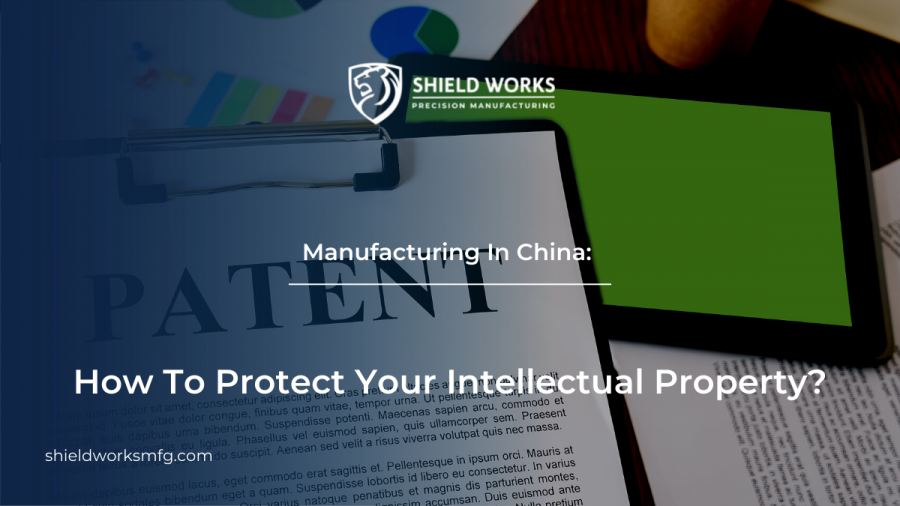
It is not surprising that China has developed to become a major manufacturing superpower and more and more overseas companies have moved their production to China. However, some of them are having issues with IP protection while manufacturing in China.
If you are planning to manufacture your products in China, make sure you do everything possible to protect your intellectual property rights. Read on to learn more about the strategies you can use to avoid patent infringement issues in the Chinese market.
What Is IP?
Before you outsource your production to China, it is important to understand what happens to your intellectual property rights (IPR) once you outsource to a Chinese manufacturer.
Intellectual property is a broad term that can include anything from a new fashion trend to a specific software algorithm to an entirely new product design.
The World Intellectual Property Organization (WIPO) makes a definition of IP as “creations of the mind, such as inventions; literary and artistic works; designs; and symbols, names and images used in commerce.”
No matter what type of intellectual property you have, there are some things you should know before starting manufacturing in China to ensure your intellectual property rights are protected.
Each Country Has Its IP Laws
Whether you are a small business or a large corporation, you have to consider how you’ll protect your intellectual property.
The first thing you should do is have a basic understanding of Chinese IP laws.
For example, patents for inventions can be protected for up to 20 years in China. Also, China protects utility models (for up to 10 years) and design patents (for up to 15 years). Utility models are sometimes called “mini-patents” and require a lower level of inventiveness. Design patents protect the look of products.
All patent rights in China are subject to the payment of annual fees after they’ve been granted.
The National IPR Organizations You Should Know In China
In China, the government plays a substantial role in promoting and protecting intellectual property rights (IPRs).
Several governmental departments are responsible for IPRs matters. Keep in mind the differences and functions of these organizations.
China National Intellectual Property Administration (CNIPA)
China National Intellectual Property Administration (CNIPA) was formerly known as the State Intellectual Property Office (SIPO). It was renamed in 1980.
The department is responsible for the patent work and comprehensively coordinating the foreign-related affairs in the field of intellectual property throughout the country.
If you want your patent registered in China, make sure you check these common questions that you will need to know:
Trademark Office of China National Intellectual Property Administration
When it comes to handling matters of trademark disputes, you should reach the Trademark Office of the China National Intellectual Property Administration.
It’s responsible for the registration and administration of trademarks throughout the country.
However, the website does not provide an English option, so it would be hard for foreigners to research and apply for a trademark online. Therefore, you can click on the CNIPA website to search for trademark-related information. Or you may go to the local trademark office to make an enquiry in person.
National Copyright Administration of the People’s Republic of China (NCAC)
If you want any copyright information, the National Copyright Administration of the People’s Republic of China website is a good option for you.
It accepts and examines copyrights applications in accordance with the law.
Keep in mind to check the copyright regulations and laws in China before you register your copyright.
IP Protection Agreement
When partnering with a manufacturing company, make sure you have a well-drafted and properly executed manufacturing agreement that will help you protect your IP, and provide you with relief if the manufacturer breaches the agreement.
The IP agreement should list all relevant details, including IP ownership, confidentiality, non-competition and non-circumvention and more.
Let Shield Works Be Your IP Protective Manufacturing Partner
With our British ownership background, we know how to help our overseas clients to protect their IPs without excessive costs and time.
Shield Works partners with Innopat a leading Zhuhai based IP industry expert to provide you with clear no-nonsense advice and IP protection services.
Our IP protective system safeguards your production line in our innovative facility.
We are ready to accommodate your needs. Contact us today.
3 Tips For Finding The Right Custom Manufacturing Partner In China
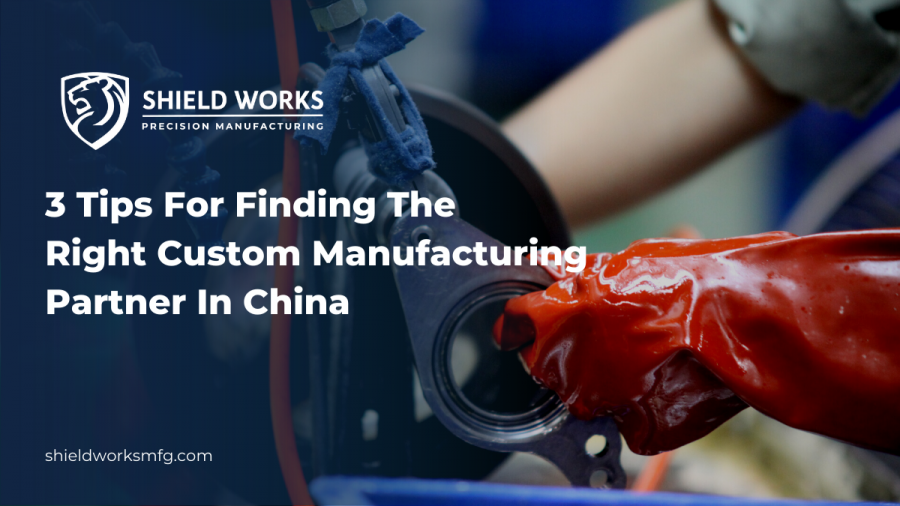
When you need to source custom manufacturing services, it can be hard to know where to start.
Finding the right custom manufacturing partner can be challenging.
There are many companies out there with the capabilities to manufacture your product, but finding the right one can be difficult and time-consuming without some guidance.
Thankfully, you don’t have to go at it alone. Here are three tips that will help make finding the right partner much easier.
Tip #1 – Know What You Want
Start by listing your needs and expectations before choosing a custom manufacturer in China.
- What’s your budget?
- Do you have a strict deadline?
- Are your product materials hard to obtain?
- Will you need samples before production begins?
All of these details can help narrow down your list of potential partners.
Finding a company that already has experience with similar projects can make sure that production goes as smoothly as possible since they’ll be familiar with what it takes to meet all your needs and deadlines.
Tip #2 – Understand Your Suppliers
Another thing to take into consideration when you’re looking for a custom manufacturer is to do your research.
Find people who have successfully worked with a company that provides custom manufacturing services.
If someone has had a good experience, you can use them as a reference to find other companies that provide similar services in case their recommendation didn’t work out so well.
Also, you can compile a comparison list of potential options.
After you list all the key factors you need to know beforehand, you’ll be ready to begin contacting them directly.
Tip #3 – Choose A Custom Manufacturer That Fits Into Your Supply Chain
Choosing a custom manufacturer requires an understanding of how they fit into your supply chain.
If you are looking to get started with rapid prototyping, then your supplier must have access to both traditional and 3D printing equipment.
This will allow them to offer you a full range of services including design iteration and custom parts made from advanced materials.
If, on the other hand, you are looking for custom injection molding services, you need a manufacturer that can handle creating tooling and assembling large quantities of products efficiently.
Remember: your final product will only be as good as your supplier’s capabilities!
Let Shield Works Be Your Custom Manufacturing Partner
If you need to customize your product, Shield Works can be your best partner in China.
We are a British owned and managed company providing customized OEM manufacturing and assembly activities.
Your product will be manufactured in one of our state-of-the-art facilities. We are prepared to accommodate your needs; from bulk production through final product finishing. Contact us today.
Why Outsourcing Medical Device Manufacturing to China Benefits You
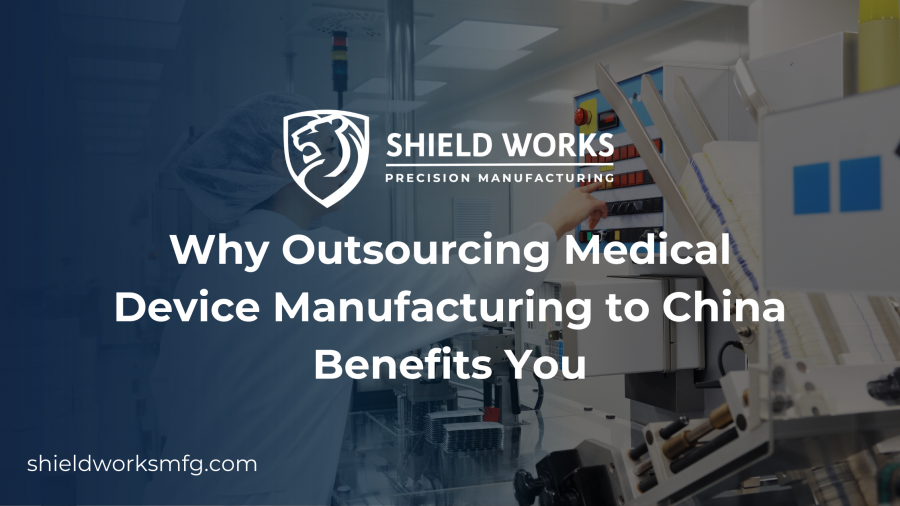
You’ve come up with an innovative new medical device or equipment, and now you want to get it into the hands of doctors and hospitals across the country. You could just hire someone in your area to build it all by hand, but that would take much longer than you’d like, and you wouldn’t be able to produce as many units as are necessary to meet your demand and get it out there quickly. By outsourcing medical equipment manufacturing to China, you can save both time and money, while ensuring quality production that meets your exact specifications. Check out these tips of outsourcing medical equipment manufacturing to China!
Selecting a Contract Manufacturer in China for Your Medical Device Product
Choosing a contract manufacturer in China for your medical equipment product can be an overwhelming task. Before you begin, it’s important to have a clear idea of what you need and what steps you will take during your search. Once you have a plan, it’s time to find a reputable company with staff that speaks English. Next, arrange meetings and build relationships with potential manufacturers. The next step is choosing which company will produce your medical equipment product.
You might as well as yourself the following questions:
- What type of medical devices do you have experience in?
- What is their track record?
- Do they use raw materials from other companies or do they purchase them themselves?
- Does each manufacturer offer fast turnarounds and great prices?
- How many years has each one been in business?
- Is there consistency among all of their products?
- Are there any customer reviews online about them?
- Can they produce products in compliance with FDA or health and safety regulations in other targeted countries?
If you are going to export to the US, do some digging on the FDA database to identify the certified manufacturing and filter out the bad seeds with track record of practice or products violating regulations. At times like this, this step should be addressed with extra importance as the regulations are always subject to change. Finally, once you’ve chosen a contract manufacturer in China for your medical equipment product, make sure to sign contracts before beginning production.
It’s also important to make sure everything is written down clearly so there are no misunderstandings later on, including the specs required by the health department. If possible, try to get samples made by both companies before making a final decision. This way you can compare quality and price side-by-side before deciding who gets the job. You want to work with someone who not only meets your needs but also exceeds expectations at every level!
Benefits of Manufacturing Your Medical Device Product in China
When you outsource your medical device manufacturing, you gain access to the following elements of production.
Quality control
When you contract with a Chinese manufacturer for your medical equipment, they will send engineers and representatives to oversee production. This means that when it comes time for delivery, your items will be free of defects and exactly as specified in your contract. It also means that any errors made during production will be caught early on so they can be corrected before being shipped out. Having someone overseeing production ensures that nothing slips through the cracks and helps prevent mistakes from occurring later down the line. Also, as we have stressed the importance of adhering to the health and regulations issued by the countries you export to, experienced teams in China should know these rules like the back of their hand and strictly perform compliance checks for you.
Cost savings
When compared to American companies specializing in contract manufacturing, Chinese companies often offer lower prices due to their lower labor costs. By outsourcing your medical device manufacturing, you’ll have more money available to invest in marketing or research and development. Also, when it comes to manufacturing medical products, sometimes it’s tricky to strike a balance between maintaining required specs and budget control. China’s experience can be of great help in this regard.
Better Time Management
This also allows you to focus on creating your unique product, while allowing a 3rd-party manufacturer develop and produce it for you and help you better manage time, resources and costs; furthermore, because they’re focused on manufacturing one or several products for multiple companies, they’re able to handle much larger volumes than most startup companies can handle. This means that when you partner with them, you won’t have bottlenecks or downtime that could lead to delays in production or delivery.
Flexibility
A lot of contract manufacturers overseas are willing to negotiate terms based on how much work they have at any given time. If there is no work coming up, then they may agree to do a small project for less money than usual. This gives you an opportunity to get additional products made without having to pay full price—something many businesses find useful since cash flow is always tight when starting up new ventures.
Working with overseas manufacturers has its own set of challenges; however, if you approach them carefully and build relationships with them over time, it’s possible that outsourcing could help make your business more successful.
Examples of Medical Device Products That Can Be Manufactured in China
A lot of medical device products are produced in China, including ventilators, cardiac monitors, blood pressure monitors and infusion devices. Sometimes manufacturers can create a better product than your competitors by using specialized suppliers or materials they have on hand. Contracting with a company that specializes in manufacturing medical equipment makes sense since outsourcing allows them to control quality and make sure everything is done within your timeline. You may have not considered outsourcing your medical equipment manufacturing because you don’t think it would be possible; but it is, and you may want to.
To learn more about how to take advantage from the highest quality of medical device products from Chinese manufacturing companies who know all the western industry standards or to speak with experts with this regard, feel free to reach out and get in touch with us here at any time!
6 Tips for Outsourcing Electronic Manufacturing to China
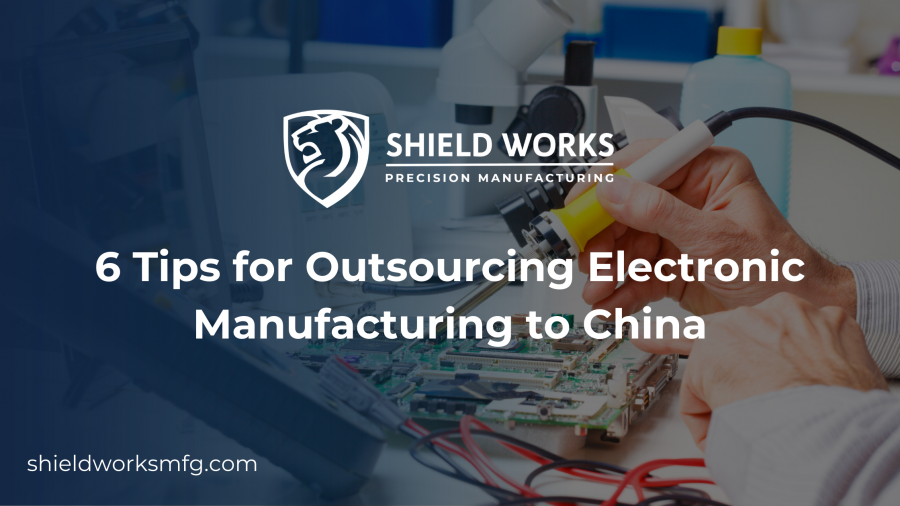
Do you have an electronic product or system design that’s perfect, but don’t have the budget to manufacture it? Would you like to get your product on the market faster than would be possible by in-house manufacturing? If so, consider outsourcing some or all of your manufacturing to China. If you choose to do this, it’s important to plan ahead and ensure that everything will run smoothly. Here are six tips for outsourcing electronic manufacturing to China
Start Small
If you have no experience with manufacturing, then begin by outsourcing one small job. This will give you valuable insight into how your product is made and how much it will cost. If everything works out, then you can consider larger production runs later on. It’s important to remember that outsourced electronic manufacturing is generally a process-driven industry, which means costs vary greatly based on scale. In addition, don’t forget that different suppliers specialize in different areas of electronic manufacturing, so choose wisely and select a company that specializes in your specific product!
Choose a Reputable Supplier
While there are numerous suppliers located in China, it’s important to choose one that is reliable, bilingual and experienced with western culture. The process of outsourcing electronic manufacturing to Chinese factories is a detailed one, and requires a bilingual manufacturer with experience in your product industry. Asking around at trade shows or on websites such as Alibaba can help you find just that. Once you’ve found a factory you like, make sure to check out their work (website photos are not always representative of actual products), and write up an agreement that outlines both parties’ responsibilities before any manufacturing begins. Once you have a contract signed by both parties, it is time to start gathering documentation required by customs officials.
Understand Costs
Before you outsource, it’s important to understand your costs. You need a good sense of what you’re going to have to spend in order to get your electronic product made in Asia. If you are outsourcing electronic manufacturing in Shenzhen, China, take some time and learn about all of your options before making a final decision. Costs can vary depending on if you are looking at domestic Chinese companies or manufacturers that are located outside of Shenzhen but still within Mainland China. Some companies will quote higher prices due to their experience working with larger manufacturers and being able to offer high-quality parts faster than smaller shops who may not be as experienced with large OEM orders.
Get Samples
Before you invest in getting a bunch of units manufactured, it’s always good to try a sample run first. This way, you can test whether there are any flaws with your design and get a sense of how many revisions your manufacturer will ask for before they produce quality products. There are also some up-front costs associated with getting samples, but it’s still much cheaper than going through a full production run only to find out that something is wrong. And once you’ve got samples in hand, you can even use them as leverage to negotiate better prices from your factory.
Save Money with Fewer Prototypes
When developing a new circuit, it’s important to test each new iteration by building a prototype. Unfortunately, prototyping is expensive, especially when you factor in labor costs. The more prototypes you need to create and test, the higher your bill will grow. One way to save money on manufacturing is outsourcing your prototyping work overseas. You can get a board made quickly and affordably at Chinese manufacturing houses like Seeed Studio and Canavas.
Make Your Specs Simple
To reduce costs, you should make your specifications as clear and simple as possible. This is especially true in regards to materials selection. For example, if you need 100 circuit boards made and one of them requires a rare-earth element found only in one mine in Russia, be sure that’s stated up front. On top of reducing costs, clear specs also improve communication between you and your manufacturer.
Shield Works is one of your best choices with a self-owned IP protection zone, in-house bilingual engineering team and over 16 years of experience of manufacturing in China for clients worldwide, especially in electronic manufacturing. Please feel free to contact us if you are interested.
Why Outsourcing Manufacturing to China Is More Financially Reasonable
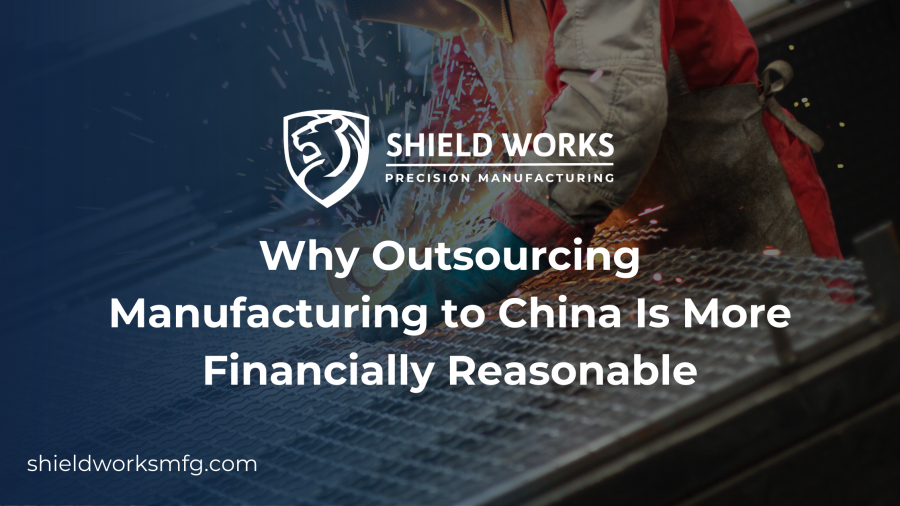
As your business grows, it’s likely that you’ll begin looking at outsourcing some of your manufacturing processes to other countries with cheaper labor costs, such as China. The problem with this practice in the past was the amount of time and money it took to hire workers overseas, monitor their progress, and then ship product back to your warehouse once they were finished. Today, contract manufacturing in China make all of these things easier, making the financial benefits that much more attractive.
Shipping Costs
Depending on where you source your goods, costs for shipping can be prohibitive. Before deciding to manufacture abroad, make sure you fully understand all shipping costs and regulations. In some cases, it’s cheaper to have a freight forwarder who specializes in international shipping do all of your importing from a single location, instead of importing from multiple countries with multiple carriers. On top of import duties, make sure you factor insurance into your cost breakdowns as well. If you’re not handling all shipping related tasks yourself, make sure you find someone who is qualified to handle these duties; if done improperly, shipping companies could lose or damage inventory which could lead to costly product recalls down the road. China’s labor forces are less expensive than other regions while its developed infrastructures mean that delivery times will be shorter because products will spend less time getting through customs. Many large retailers use Chinese manufacturers due to their central locations and short delivery times — many major ports in China are only a few hours away by ship — compared to other manufacturing locations like Mexico or Brazil, which could take up to two weeks for products to reach their destinations by sea.
Currency Conversion
One of the most common concerns about investing in Chinese manufacturing is currency risk. But RMB is very stable given the current climate. It has appreciated a mere 1.3% against the USD over the past year. And, looking back to 2005, when China joined the WTO and opened its borders to western-style investment and trade, RMB has only depreciated roughly 4%. There’s no reason not to be bullish on RMB for years to come. The currency is well-managed by the Chinese government (albeit with some nefarious strings attached), making it a very safe bet for dollar denominated transactions.
Freight Forwarder Costs
Freight Forwarders cost less in China, both in price and percentage of gross profit. Generally speaking, freight forwarders keep anywhere from 5% to 7% of a company’s gross profit as their service fee, but in China they can often cut that to 3%. For example, take a 4 million dollar shipment: A Freight Forwarder might only charge $80,000 instead of $200,000.
Quality Control Costs
There are many reasons why quality control services in China are cheaper but better than many other countries. Quality control services in China have been developed for years, and it has become mature enough. The cost of quality control services in China has been reduced a lot, and it’s much cheaper than other places like Hong Kong and Taiwan. Factories pay less attention on their manpower costs, they tend to hire more workers with less experience and skills, which makes the production lines much slower than before. Factories produce their goods with lower requirement of quality than international standard levels because they hope to sell them in domestic market easily, not paying too much attention on products defects caused by human errors.
Labor Costs in China
Labor costs are still lower than other countries despite rising and labors there are more skilled. While the rise may seem like it’s not worth taking a risk on an overseas location, consider that other manufacturing countries such as South Korea and India have labor costs that are double or even triple what workers make in urban areas of China. Furthermore, according to management consultant The Boston Consulting Group (BCG), labor productivity actually increased in 2013 by 18%, which means that wages have been increasing steadily while work conditions remain favorable for employers. Owing to its high-quality workforce, innovative industry and strong infrastructure network, China has built up global supply chains over time. Most companies choose to locate their factories there due to its strategic location connecting major Western markets. Despite being 3 times farther away from Europe than Mexico and almost 4 times farther away than Bangladesh, more products go through Chinese ports into Europe because Chinese coastal cities are closer.
How Does This Relate To My Product Idea?
You can focus more on renovating and marketing your product by outsourcing manufacturing to China. Since it costs less to manufacture abroad, you can put that money back into your product and save a bundle on quality control in China. If it doesn’t work out, you can switch factories easily without losing much of your initial investment. However, outsourcing isn’t right for every type of business and manufacturing abroad takes time to figure out—but if you’re willing to take a risk and have faith in your company’s vision, getting started with China production could be a smart choice for your bottom line.
With the British background and China base of Shield Works as well as our international bilingual team members and 3PL services worldwide, it is a great option to enjoy quality of China manufacturing and hassle-free process. Leave all your manufacturing troubles to us. If interested, please feel free to contact us.
